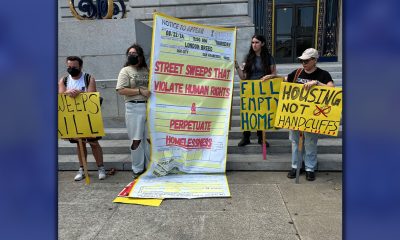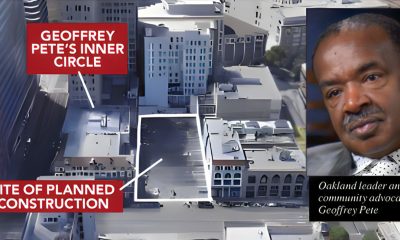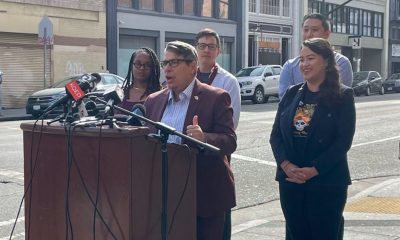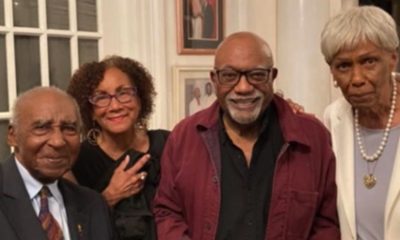Activism
OPINION: Are We About to See the Permanent Exclusion of Most Black People from Construction Jobs in Oakland?
How is that possible in this city that is believed by the world to be very progressive? Most of the work goes to members of the construction unions that have historically and currently excluded Black people through a complex set of membership requirements.

By Kitty Epstein
For decades Black people in Oakland have obtained 9% or less of the work hours on publicly funded construction projects. So…for jobs that are paid for by all of our tax dollars, Black residents, who make up 23% of Oakland’s population, get only 9% of the relatively well-paid work doing construction.
How is that possible in this city that is believed by the world to be very progressive? Most of the work goes to members of the construction unions that have historically and currently excluded Black people through a complex set of membership requirements.
Nationally, only 7.2% of the carpenters’ union members are Black; 8.3% of the electricians’ union members and so on. The City of Oakland has done two very thorough reports of these racial equity issues. You can find this important information at the end of this story.
But the leadership of the construction trades now insist that that they should obtain an even larger portion of the construction hours and that this practice should be set in stone by something called a Project Labor Agreement. It is now being inaccurately called a “Community Workforce Agreement,” which is nonsense because it doesn’t help the community.
Why would progressive Oakland consider giving exclusive benefits to organizations that practice well-documented racial discrimination? At least one part of the reason is that the construction unions spend enormous amounts of money on Oakland elections. They were instrumental in former City Councilmember Desley Brooks’ defeat in District 6, for example, because they did not consider her sufficiently compliant with their demands.
The City Council established a task force to discuss the racial issues involved in construction and the possibility of a Project Labor Agreement. The task force included some community members, including the publisher of the Oakland Post, and was mandated to address racial discrimination first.
The community members proposed that the entire task force work collectively throughout the process of making proposals and negotiating solutions. The City rejected this proposal and began meeting with the building trades alone, saying that they would return with a proposed Project Labor Agreement, although there has been no demonstrated change in the racial exclusivity practiced by the construction trades.
This is outrageous on three levels:
- These are the tax dollars of Black residents, as well as others.
- The community’s interests in racial justice have not been resolved in any policy venue.
- The community belongs at the table throughout whatever process takes place.
The usual arguments for labor/employer negotiations do not apply. The construction unions are NOT city workers. If they were city employees, they would have both the rights (negotiations) and the responsibilities (non-discriminatory hiring) of the city. Since they are not held responsible to Include Black people in their organizations, they should not have the right to exclusive negotiations about anything
I am hopeful, of course, that the City will reject the continuation and expansion of racial discrimination policies practiced by the leadership of the trades unions and will insist on the drastic changes necessary for Black people to obtain 23% of the work hours they are due by virtue of their proportion of the population and tax dollars contributed.
These two documents below provide information that is both illuminating and horrifying.
Oakland Equity Indicators: https://www.oaklandca.gov/projects/oakland-equity-indicators
Activism
2024 in Review: 7 Questions for Equality California Political Director Shay Franco-Clausen
Shay Franco-Clausen is an award-winning public advocate, speaker, political strategist and former elected official. She has contributed her thought leadership to drafting seventeen pieces of legislation in California. Notable among these accomplishments is her role in extending the statute of limitations for felony domestic violence survivors, advocating for the rights of foster youth, preserving endangered open spaces, and championing the restoration of voting rights for individuals on parole.

By Edward Henderson, California Black Media
Shay Franco-Clausen is Political Director for Equality California, the nation’s largest statewide LGBTQ+ civil rights organization.
Franco-Clausen is an award-winning public advocate, speaker, political strategist and former elected official. She has contributed her thought leadership to drafting seventeen pieces of legislation in California. Notable among these accomplishments is her role in extending the statute of limitations for felony domestic violence survivors, advocating for the rights of foster youth, preserving endangered open spaces, and championing the restoration of voting rights for individuals on parole.
California Black Media (CBM) spoke with Franco-Clausen about her successes, frustrations and future plans heading into 2025.
Looking back at 2024, what stands out to you as your most important achievement and why?
In the role that I sit in as the political director for Equality California, we endorsed 216 candidates. I think the one achievement after this election that I’m proud of is that we overturned Prop 8 to protect same-sex marriages here because they’re about to attack our rights on the federal level, come 2025.
I’m glad at least we changed our California constitution to reflect and protect my marriage.
How did your leadership and investments contribute to improving the lives of Black Californians?
I contribute through my lived experience. I may have achieved a lot, but I come from those same communities that are marginalized, East Oakland, East San Jose, Watts. It gives me a different perspective. I am a formerly incarcerated youth who was in foster care. I think I contribute that bit of understanding, and I operate from an equity lens. I’m willing to push people to make them recognize that hey, you cannot forget about Black people. We are the most marginalized.
What frustrated you the most over the last year?
What frustrates me is our inability to recognize that we forget people. I was tapped to work on the Harris campaign from Equality California. And through that, being at that table, I was frustrated that they weren’t listening to Americans and not looking at the data.
The reason Trump won is because he had consistent messaging, and we didn’t debunk it. I think I’m more frustrated that we don’t fully listen to people all the time when they’re critiquing us.
What inspired you the most over the last year?
All those people that came out to support Kamala Harris. I was proud that my son voted for the first time for a Black woman for President.
What is one lesson you learned in 2024 that will inform your decision-making next year?
Be fearless. Sometimes I second-guess myself. I push back, but I could push more because I’m qualified. I have the education, I have the experience, and I know what I’m talking about in all the rooms that I go in. And I must be confident in that.
In one word, what is the biggest challenge Black Californians face?
Prioritization.
We’re still not seen as a priority, but everyone likes to add us to their talking points.
What is the goal you want to achieve most in 2025?
Writing a book. I think it’s important for us to tell our stories.
I am also kicking off my campaign for Hayward City Council.
Activism
2024 in Review: 7 Questions for California Black Chamber of Commerce CEO Jay King
Jay King is also a member of the popular 1980s R&B group Club Nouveau. In his role as an artist and activist, he has stood up for issues affecting underrepresented Californians for over three decades. As the President of the CBCC, King says he is determined to put his mark on developing and expanding the capacity of African American businessmen and women.
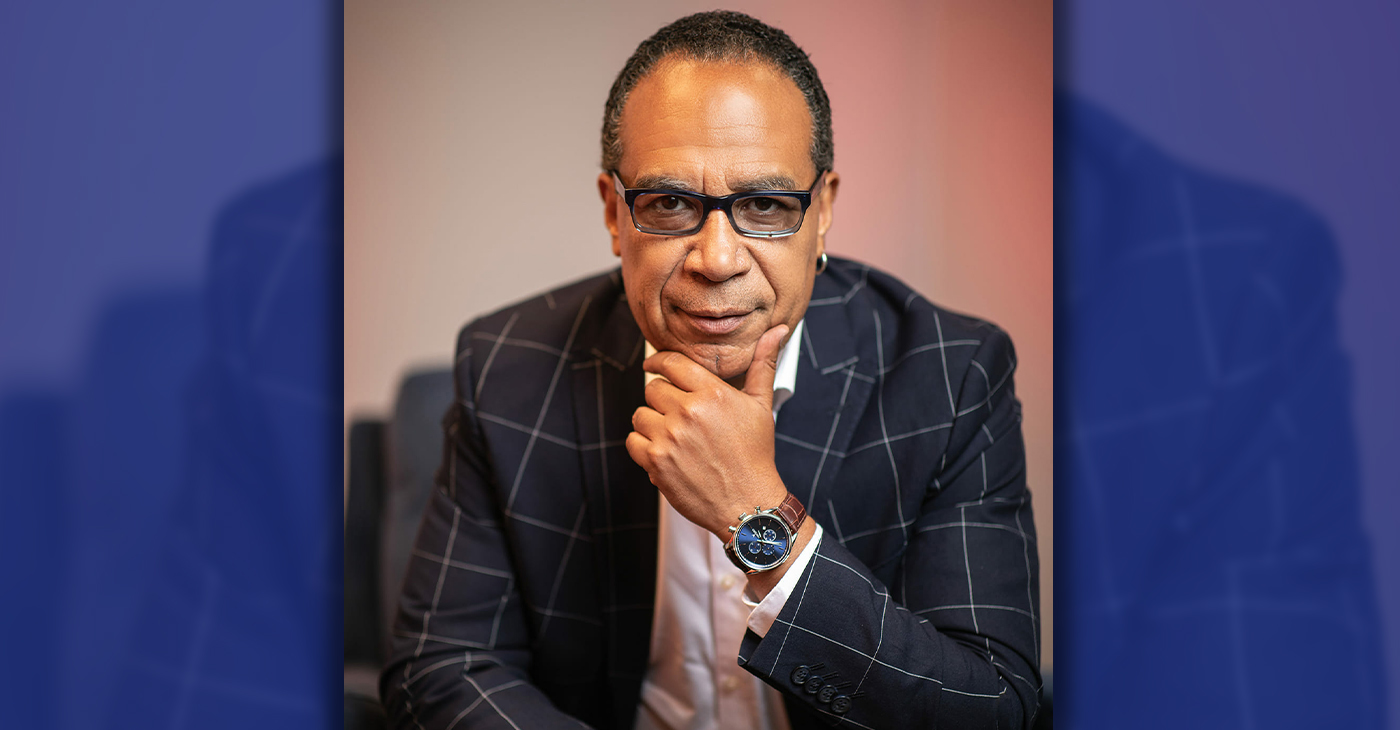
By Edward Henderson, California Black Media
Grammy Award-winning singer and record label executive, Jay King, was elected CEO/President of the California Black Chamber of Commerce (CBCC) in June of 2019.
The CBCC is the largest African American non-profit business organization, representing thousands of small and emerging businesses, affiliates, and chambers of commerce throughout California.
King is also a member of the popular 1980s R&B group Club Nouveau. In his role as an artist and activist, he has stood up for issues affecting underrepresented Californians for over three decades.
As the President of the CBCC, King says he is determined to put his mark on developing and expanding the capacity of African American businessmen and women.
California Black Media (CBM) spoke with King recently. He reflected on the Chamber’s accomplishments, disappointments, lessons learned this year, and goals moving forward.
Looking back at 2024, what stands out as your most important achievement and why?
Making the voices of micro and mini-micro businesses loud, forcing policymakers and other decision makers across the state to pay attention to them. With legislation in place now — AB 1574 and AB 2019 – that mandates that the state and agencies affiliated with the state extend opportunities to micro and mini business owners and give them a chance to participate in government contracting in a real way.
How did your leadership and investments contribute to improving the lives of Black Californians?
I really want to contribute to the world and the state of Black businesses because of the systemic inequities in the past.
Small business, micro businesses and mini businesses are too often overlooked.
I think it would be egotistical to believe that I make any significant impact on my own. Whether it’s the Asian Chamber, Hispanic Chamber and other organizations that are fighting the same fight. I think it’s a collective, so I’m proud to be part of the collective.
What frustrated you the most over the last year?
We say we want to give access to capital to small businesses, yet we continue to create barriers that deny them access.
What inspired you the most over the last year?
Watching some of the small business owners that we worked with — these micro businesses — and seeing the potential and the power that is in front of us.
What is one lesson you learned in 2024 that will inform your decision-making next year?
We have to fight for Black business owners, but they also have to be prepared; because if they’re not, it affects us all down the line.
In one word, what is the biggest challenge Black Californians face?
Self-belief. I think we have been conditioned on victimization and victimhood. We think that if we don’t get the help we need that we will falter.
What is the goal you want to achieve most in 2025?
I want to change the trajectory of micro and mini business owners.
Activism
COMMENTARY: My Sunday School Lesson with President Jimmy Carter
When I saw him, Carter was spry, quick-witted, and kind. The former president wore a bolo string tie anchored by an eight-stone turquoise clasp that dangled below the neck, as he began the lesson on the subject of grief and the death of his 28-year-old grandson. Drawing from scripture (on this particular day, a passage on the persecution of the Thessalonians), Carter said such moments were simply tests of one’s faith, endurance, and hope.
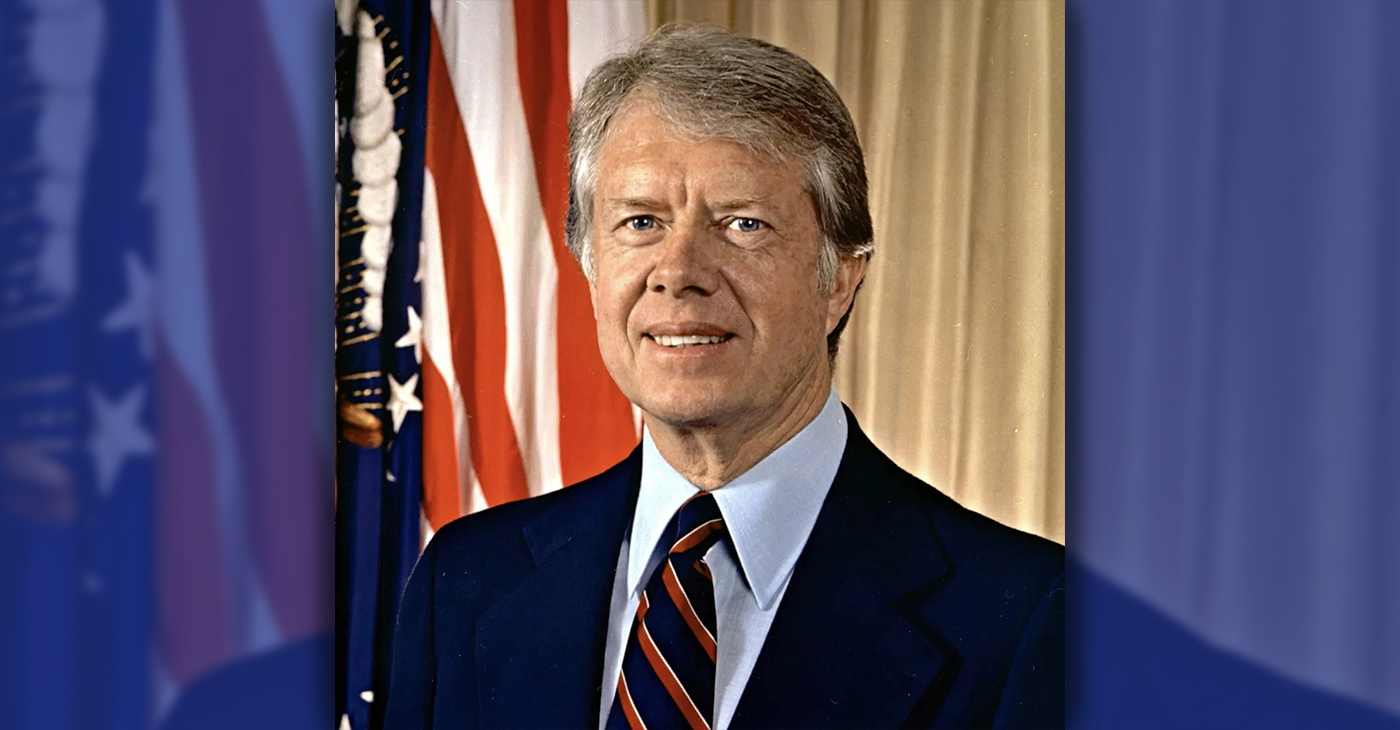
By Emil Guillermo
President Jimmy Carter, at age 100, didn’t make it to the new year, nor the next presidential inaugural.
I’ve always been a big Carter fan, so the news of his passing brought me back to a happy place.
Plains, Georgia, 2016.
I was visiting family not far from the land of presidential peanut farmers. I found myself the only full-blooded Filipino in the room at Maranatha Baptist Church, the spiritual home base for the esteemed No. 39.
President Carter looked fine that Sunday in Plains. But especially fine for his job on that day– to give the Sunday school lesson on what coincidentally was the 15th anniversary of 9/11.
Carter’s health made headlines in 2015 when he disclosed having both brain and liver cancer. It was thought he had just two or three weeks to live.
Everyone’s always underestimating Carter. After treatments, Carter’s forecast turned out not to be true.
When I saw him, Carter was spry, quick-witted, and kind. The former president wore a bolo string tie anchored by an eight-stone turquoise clasp that dangled below the neck, as he began the lesson on the subject of grief and the death of his 28-year-old grandson. Drawing from scripture (on this particular day, a passage on the persecution of the Thessalonians), Carter said such moments were simply tests of one’s faith, endurance, and hope.
“We lack inspiration, we lack the idealism to set our goals high. We’ve been satisfied with mediocrity. And I include myself,” Carter said. People want an average life, instead of aspiring to be, “outstanding, or superb or brilliant or exceptional.”
“I’m afraid that our country and its effect on people of other nations has suffered from the aftermath of 9/11,” Carter said. He “didn’t want to brag,” but said his goal for the country was always to be “superb and be a country that promoted peace and human rights…While I was in office, we never dropped a bomb, lost a missile, or fired a bullet.”
“Since 9/11,” Carter said, “we’ve pretty much abandoned our commitment to human rights as we reacted to terrorism.” He lamented that Afghanistan had become the longest war in American history, a direct outcome of 9/11, as well as the invasion of Iraq, which Carter called “unnecessary.”
Carter, whose administration took us out of an energy crisis, also pointed out how the U.S. is still suffering from a financial crisis that has exposed a deep inequality that has divided us as a people.
“We’ve become distrustful of people who are different from us,” Carter said. “We used to be a proud heterogeneous nation…and now we are fearful…and we’ve become poorer as a country.”
Carter won a Nobel Peace Prize in 2002; a fact that belies how many conservatives view his efforts to find a peace in the Middle East as “anti-Semitic.”
Jimmy Carter’s worldview requires open minds to come together. Too often. these days, that seems nearly impossible.
About the Author
Emil Guillermo is a journalist and commentator He was the first Filipino American to host a national news show in 1989 at NPR’s “All Things Considered.” See Emil Amok’s Takeout on www.patreon.com/emilamok Subscribe to him on YouTube.com/@emilamok1
-

 Activism2 weeks ago
Activism2 weeks agoBooks for Ghana
-

 Activism4 weeks ago
Activism4 weeks agoPost News Group to Host Second Town Hall on Racism, Hate Crimes
-

 Arts and Culture3 weeks ago
Arts and Culture3 weeks agoPromise Marks Performs Songs of Etta James in One-Woman Show, “A Sunday Kind of Love” at the Black Repertory Theater in Berkeley
-

 Activism4 weeks ago
Activism4 weeks agoButler, Lee Celebrate Passage of Bill to Honor Congresswoman Shirley Chisholm with Congressional Gold Medal
-

 Activism3 weeks ago
Activism3 weeks ago‘Donald Trump Is Not a God:’ Rep. Bennie Thompson Blasts Trump’s Call to Jail Him
-

 Activism4 weeks ago
Activism4 weeks agoDelta Sigma Theta Alumnae Chapters Host World AIDS Day Event
-

 Business4 weeks ago
Business4 weeks agoLandlords Are Using AI to Raise Rents — And California Cities Are Leading the Pushback
-

 Bay Area2 weeks ago
Bay Area2 weeks agoGlydways Breaking Ground on 14-Acre Demonstration Facility at Hilltop Mall


